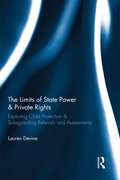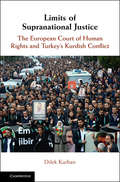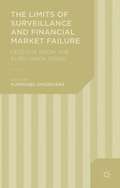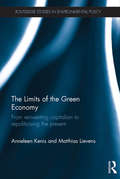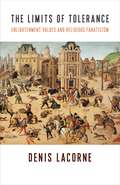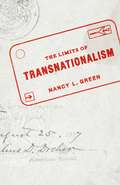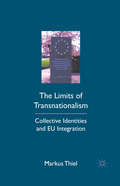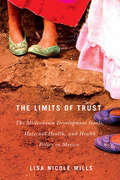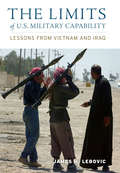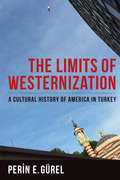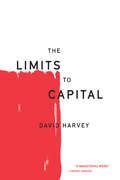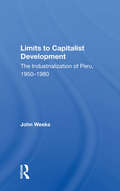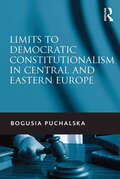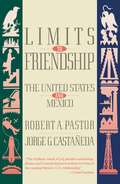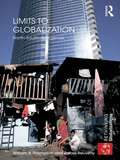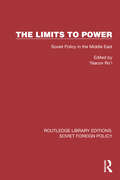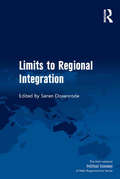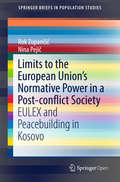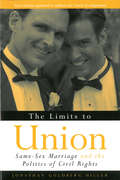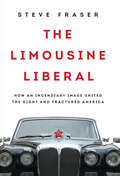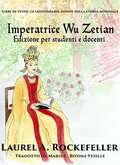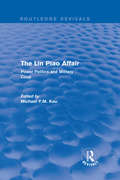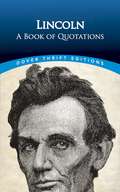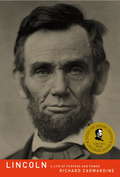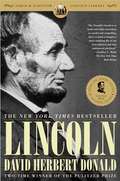- Table View
- List View
The Limits of State Power & Private Rights: Exploring Child Protection & Safeguarding Referrals and Assessments
by Lauren DevineThis book tackles a complex area of law, social policy and social work, providing a comprehensive analysis of the theoretical, practical and legal boundaries of State power following safeguarding and child protection referrals in England. The book examines the history, rationale and implications of the current position, concluding that the balance of power is weighted in favour of the State. The Limits of State Power & Private Rights is ground-breaking in its approach to the subject and its detailed, critical analysis. Traditionally the subject matter of the book is considered within a welfare framework. The analysis in this book argues that a policing agenda is embedded within policy but without appropriate safeguards and controls, creating potentially irreconcilable tension described by the author as the ‘welfare/policing dichotomy’. This book is of importance to academics, lawyers, social workers, policy makers, practitioners and service users. The book is written so as to be accessible to a multi-disciplinary audience, but is sufficiently detailed so as to be suitable for specialists and non-specialists alike in this subject area. The chapters include introductory and contextual sections as well as doctrinal, theoretical and socio-legal analysis. Although the focus is on the English system, the book is equally applicable to the many worldwide jurisdictions adopting the Anglo/American ‘child rights’ based framework of child protection. It is also of use as a comparative work in countries where a family support based system is practiced.
Limits of Supranational Justice: The European Court of Human Rights and Turkey's Kurdish Conflict
by Dilek KurbanWith its contextualized analysis of the European Court of Human Rights' (ECtHR) engagement in Turkey's Kurdish conflict since the early 1990s, Limits of Supranational Justice makes a much-needed contribution to scholarships on supranational courts and legal mobilization. Based on a socio-legal account of the efforts of Kurdish lawyers in mobilizing the ECtHR on behalf of abducted, executed, tortured and displaced civilians under emergency rule, and a doctrinal legal analysis of the ECtHR's jurisprudence in these cases, this book powerfully demonstrates the Strasbourg court's failure to end gross violations in the Kurdish region. It brings together legal, political, sociological and historical narratives, and highlights the factors enabling the perpetuation of state violence and political repression against the Kurds. The effectiveness of supranational courts can best be assessed in hard cases such as Turkey, and this book demonstrates the need for a reappraisal of current academic and jurisprudential approaches to authoritarian regimes.
The Limits of Surveillance and Financial Market Failure
by Kumiharu ShigeharaThis book examines the effectiveness of surveillance by international institutions for financial crisis prevention. It discusses issues relating to designing effective micro- and macro-prudential policies, their mixes and their coordination with monetary policies for achieving financial stability while promoting better macroeconomic performance.
The Limits of the Green Economy: From re-inventing capitalism to re-politicising the present (Routledge Studies in Environmental Policy)
by Anneleen Kenis Matthias LievensProjecting win-win situations, new economic opportunities, green growth and innovative partnerships, the green economy discourse has quickly gained centre stage in international environmental governance and policymaking. Its underlying message is attractive and optimistic: if the market can become the tool for tackling climate change and other major ecological crises, the fight against these crises can also be the royal road to solving the problems of the market. But how ‘green’ is the green economy? And how social or democratic can it be? This book examines how the emergence of this new discourse has fundamentally modified the terms of the environmental debate. Interpreting the rise of green economy discourse as an attempt to re-invent capitalism, it unravels the different dimensions of the green economy and its limits: from pricing carbon to emissions trading, from sustainable consumption to technological innovation. The book uses the innovative concept of post-politics to provide a critical perspective on the way green economy discourse represents nature and society (and their interaction) and forecloses the imagination of alternative socio-ecological possibilities. As a way of repoliticising the debate, the book advocates the construction of new political faultlines based on the demands for climate justice and democratic commons. This book will be of interest to students and scholars of environmental politics, political ecology, human geography, human ecology, political theory, philosophy and political economy. Includes a foreword written by Erik Swyngedouw (Professor of Geography, Manchester University).
The Limits of Tolerance: Enlightenment Values and Religious Fanaticism (Religion, Culture, and Public Life #4)
by Denis LacorneThe modern notion of tolerance—the welcoming of diversity as a force for the common good—emerged in the Enlightenment in the wake of centuries of religious wars. First elaborated by philosophers such as John Locke and Voltaire, religious tolerance gradually gained ground in Europe and North America. But with the resurgence of fanaticism and terrorism, religious tolerance is increasingly being challenged by frightened publics.In this book, Denis Lacorne traces the emergence of the modern notion of religious tolerance in order to rethink how we should respond to its contemporary tensions. In a wide-ranging argument that spans the Ottoman Empire, the Venetian republic, and recent controversies such as France’s burqa ban and the white-supremacist rally in Charlottesville, The Limits of Tolerance probes crucial questions: Should we impose limits on freedom of expression in the name of human dignity or decency? Should we accept religious symbols in the public square? Can we tolerate the intolerant? While acknowledging that tolerance can never be entirely without limits, Lacorne defends the Enlightenment concept against recent attempts to circumscribe it, arguing that without it a pluralistic society cannot survive. Awarded the Prix Montyon by the Académie Française, The Limits of Tolerance is a powerful reflection on twenty-first-century democracy’s most fundamental challenges.
The Limits of Transnationalism
by Nancy L. GreenTransnationalism means many things to many people, from crossing physical borders to crossing intellectual ones. The Limits of Transnationalism reassesses the overly optimistic narratives often associated with this malleable term, revealing both the metaphorical and very real obstacles for transnational mobility. Nancy L. Green begins her wide-ranging examination with the story of Frank Gueydan, an early twentieth-century American convicted of manufacturing fake wine in France who complained bitterly that he was neither able to get a fair trial there nor to enlist the help of US officials. Gueydan’s predicament opens the door for a series of inquiries into the past twenty-five years of transnational scholarship, raising questions about the weaknesses of global networks and the slippery nature of citizenship ties for those who try to live transnational lives. The Limits of Transnationalism serves as a cogent reminder of this topic’s complexity, calling for greater attention to be paid to the many bumps in the road.
The Limits of Transnationalism
by Markus ThielThrough the application of public opinion, interview, and print-media analyses, this book provides evidence that the state of transnational identification among citizens in the EU as a result of post-Maastricht integration measures, such as the completion of the Common Market, the introduction of the Euro, the initiation of the Common Foreign and Security Policy etc. in the United Kingdom, Ireland, and Germany had limited effects in the member states to the extent that national political cultures and mass media orientations are compatible with the goals of EU integration. Policy recommendations are derived by reviewing the complex relationship between EU policies and structural factors such as immigration, ageing and the mediatization of politics in which European integration occurs.
The Limits of Trust: The Millennium Development Goals, Maternal Health, and Health Policy in Mexico (McGill-Queen's Studies in Gender, Sexuality, and Social Justice in the Global South #3)
by Lisa Nicole MillsWhen the United Nations announced the Millennium Development Goals (MDGs) in 2000, approximately half a million women worldwide died each year from complications associated with pregnancy and childbirth. The fifth MDG aimed to reduce the maternal mortality rate by 75 per cent between 1990 and 2015, but by the target date, the goal had not been reached. In The Limits of Trust Lisa Nicole Mills investigates the reasons why Mexico in particular did not meet its objective. Focusing on the states of Guerrero, Chiapas, and Oaxaca, where maternal mortality rates are the highest in the country, Mills looks into how MDG 5 has been implemented in Mexico, how it has been experienced by individuals and groups, what obstacles have been encountered, and what factors have facilitated improvements in maternal health. Using data gathered from interviews with NGOs, government officials, and health care workers, the book argues that government and feminist NGO efforts to build trust in the health care system have fallen short because of systemic failures to protect women’s rights and enhance the quality of health care. In Mexico a woman’s risk of dying from a pregnancy‐related complication is five times higher than in developed countries. The Limits of Trust explores the realities of implementing maternal health initiatives on the ground in rural, remote, and impoverished areas, and the steps that can be taken to successfully combat maternal mortality.
The Limits of U.S. Military Capability: Lessons from Vietnam and Iraq
by James H. LebovicPolitical scientist James H. Lebovic establishes that the size, strength, flexibility, and adaptability of the U.S. military cannot ensure victory in asymmetrical conflicts.In The Limits of U.S. Military Capability, Lebovic shows how political and psychological factors trumped U.S. military superiority in Vietnam and Iraq, where inappropriate strategies, low stakes, and unrealistic goals mired the United States military in protracted, no-win conflicts. Lebovic contends that the United States is at a particular disadvantage when fighting a counterinsurgency without the full support of the host government; when leveraging various third parties (the adversary's foreign allies, societal leaders, and indigenous populations); when attempting to build coalitions and nations while involved in combat; and when sustaining government and public support at home when costs rise and benefits decline.Lebovic cautions against involving the U.S. military in operations without first considering U.S. stakes and suggests that the military take a less-is-more approach when choosing to employ force. Ambitious goals bring higher costs, unexpected results, diminished options, and a greater risk of failure. Rejecting the heavy-handed approach that is typical of most comparisons between the Vietnam and Iraq wars, The Limits of U.S. Military Capability carefully assesses evidence to develop lessons applicable to other conflicts—especially the ongoing war in Afghanistan.
The Limits of Westernization: A Cultural History of America in Turkey (Columbia Studies in International and Global History)
by Perin GürelIn a 2001 poll, Turks ranked the United States highest when asked: "Which country is Turkey's best friend in international relations?" When the pollsters reversed the question—"Which country is Turkey's number one enemy in international relations?"—the United States came in second. How did Turkey's citizens come to hold such opposing views simultaneously? In The Limits of Westernization, Perin E. Gürel explains this unique split and its echoes in contemporary U.S.-Turkey relations. Using Turkish and English sources, Gürel maps the reaction of Turks to the rise of the United States as a world-ordering power in the twentieth century. As Turkey transitioned from an empire to a nation-state, the country's ruling elite projected "westernization" as a necessary and desirable force but also feared its cultural damage. Turkish stock figures and figures of speech represented America both as a good model for selective westernization and as a dangerous source of degeneration. At the same time, U.S. policy makers imagined Turkey from within their own civilization templates, first as the main figure of Oriental barbarism (i.e., "the terrible Turk"), then, during the Cold War, as good pupils of modernization theory. As the Cold War transitioned to the War on Terror, Turks rebelled against the new U.S.-made trope of the "moderate Muslim." Local artifacts of westernization—folk culture crossed with American cultural exports—and alternate projections of modernity became tinder for both Turkish anti-Americanism and resistance to state-led modernization projects. The Limits of Westernization analyzes the complex local uses of "the West" to explain how the United States could become both the best and the worst in the Turkish political imagination. Gürel traces how ideas about westernization and America have influenced national history writing and policy making, as well as everyday affects and identities. Foregrounding shifting tropes about and from Turkey—a regional power that continues to dominate American visions for the "modernization" of the Middle East—Gürel also illuminates the transnational development of powerful political tropes, from "the Terrible Turk" to "the Islamic Terrorist."
The Limits to Capital
by David HarveyThe Limits to Capital provides one of the best theoretical guides to the history and geography of capitalist development. In this new edition, Harvey updates his classic text with a substantial discussion of the turmoil in world markets today.In his analyses of ‘fictitious capital’ and ‘uneven geographical development’ Harvey takes the reader step by step through layers of crisis formation, beginning with Marx’s controversial argument concerning the falling rate of profit, moving through crises of credit and finance, and closing with a timely analysis geopolitical and geographical considerations.
Limits To Capitalist Development: The Industrialization Of Peru, 1950-1980
by John WeeksDr. Weeks presents a detailed critique of dependency theory as an explanation of underdevelopment and offers an alternative theory based on the internal contradictions within underdeveloped countries and the competitive nature of international capitalism. Applying his theory to Peru, he shows how the country has been transformed over the last thirt
Limits to Democratic Constitutionalism in Central and Eastern Europe
by Bogusia PuchalskaIn this book, Bogusia Puchalska develops an original theory of democratic constitutionalism and uses it to support the argument that constitution-making and law-making in constitutional moments should be politically, and not just constitutionally, legitimate. In doing so she expertly assesses the potential implications of the prospects of democratic consolidation and constitutionalism in Poland after 1989 and asks whether it is likely to be applicable to other transition countries such as Hungary, Czech Republic and Slovakia. This original and informative book should be read by all curious to understand how the democratic learning and the foundations of grass-root constitutionalism might have been damaged in post-communist countries.
Limits to Friendship: The United States and Mexico
by Robert A. PastorAn unfettered, probing dialogue between Mexican and American political analysts on the complex relationship between their countries.Few nations are as closely interrelated as the United States and Mexico. Few relationships between nations are so prickly. America's inveterate problem-solving strikes Mexicans as clandestine imperialism. Mexicans are accused of ignoring the flow of drugs through their country; Americans are accused of saddling Mexico with their drug problem. Americans brood over the influx of Mexican immigrants; Mexicans worry that their culture and traditions are being diluted from the north.These differences are now aired--and their origins made clear--in this landmark book by a former official in the Carter administration and one of Mexico's most respected political scholars. In alternating chapters on foreign policy, economic relations, immigration, and social influence, Robert A. Pastor and JorgeC. Castañeda offer a multifaceted view of the ties and conflicts between their countries.
Limits to Globalization: North-South Divergence (Rethinking Globalizations #21)
by William R. Thompson Rafael ReuvenyIn the post-Cold War era, economic globalization has loomed, at least for some, as the world system's next crisis carrier, creating winners and losers and trampling on the distinctiveness of local cultures. Yet the liberal assumption is that if the market does its job, the poor will catch up to the rich via trade-driven growth and the economies of developed and less developed countries will gradually converge. Investigating the processes of economic globalization, this book explores whether it is truly a "global" process. It examines how globalization is experienced around the world, comparing its intensity and impact in both the global North and South. Using a world systems approach and developing a theoretical analysis that builds on the leadership long-cycle approach to global political economy, this book seeks to dispel some of the myths widely propagated regarding economic development. Through a focus on the issues of technological diffusion, debt, conflict, and democratisation, the authors demonstrate how and why the asymmetries that have characterized the global North and South in the past and present are growing more acute. This important book will be of interest to students and scholars of international political economy, globalisation, international trade and development.
The Limits to Power: Soviet Policy in the Middle East (Routledge Library Editions: Soviet Foreign Policy #10)
by Yaacov Ro’iThe Limits to Power (1979) analyses the spectrum of Soviet interests and policies in the Middle East following the Yom Kippur War of October 1973: how the Soviets handled the oil question, military and economic aid, policy toward Egypt, Syria, Iraq, the Palestinian organisations – and toward Israel itself. The Soviet position in the Middle East in 1970 was as the dominant foreign power in the region, and this book examines the events and actions that resulted, under a decade later, in such a sharp reversal in Soviet fortunes. The ebb-and-flow of Soviet diplomacy, as it emerges from the wealth of official statements and press material, is examined in detail.
Limits to Regional Integration (The International Political Economy of New Regionalisms Series)
by Søren DosenrodeRegionalization in general and regional integration in particular have taken place at a growing pace since the end of the Cold War, when states were set free from various security overlays. Regional integration is ’logical’ as it is supposed to advance wealth and peace. Still, the picture is far from clear and the process of regional integration is not automatic; disintegration takes place, as we saw in the cases of the Soviet Union, Yugoslavia and Czechoslovakia to mention a few. This is the case not only in states recently brought together but also in traditional states like Britain, The Netherlands and Spain where strong groups strive for independence. In some places regionalization is flourishing, but regional integration is not. Some regional integration projects like the North American Free Trade Agreement and Mercosur seem to stagnate. Certainly there are limits to regional integration. This comprehensive volume, written by high profiled academics, covers these themes by examining eleven cases ranging from the lack of integration in the Arctic and the Middle East, to ongoing or progressing integration in Europe to uncover what ’blocks’ regional integration, the results of which are used for developing new theoretical insights.
Limits to the European Union’s Normative Power in a Post-conflict Society: Eulex And Peacebuilding In Kosovo (SpringerBriefs in Population Studies)
by Nina Pejič Rok ZupančičBy shedding light on EULEX - the EU mission to Kosovo – this open access book investigates the EU’s peacebuilding activities in that country, in the light of the normative power theory in the post-conflict setting and peacebuilding theory. Ten years after the massive engagement of the EU in the country torn by war, the authors critically assess the effects of the EU projecting its normative power – the enforcement of its standards, ‘good’ or ‘bad’ – through the EULEX mission, taking into consideration also the local aspects, so far neglected in this field of research. Inspecting thoroughly the EULEX activities in the police, customs and judiciary sector, the authors reveal that the mission can contribute to a positive change, but only in those cases which do not request a heavy political involvement and broad leverage by other international players (for example in improving standards of work in police and customs). When it comes to the most serious cases of organized crime, corruption and war crimes, EULEX, however, has not been able to address them effectively due to several internal mission’s deficiencies and external factors; the perceived ineffectiveness of EULEX among the local population led to the lowering of trust not only in this CSDP mission, but also in the EU in general. This open access book offers a comprehensive assessment of the EULEX mission, based on two Horizon2020 research projects: IECEU - Improving the Effectiveness of Capabilities in EU Conflict Prevention, and KOSNORTH – The European Union and its Normative Power in a Post-conflict Society: A Case Study of Northern Kosovo (Marie Sklodowska-Curie Individual Fellowship). As such it is an invaluable resource for scholars, students and policymakers interested in security questions in South Eastern Europe and EU external action.
The Limits to Union: Same-Sex Marriage and the Politics of Civil Rights
by Jonathan Goldberg-HillerRevised and updated to include the most current information on same-sex marriage, The Limits to Union documents a legal struggle at its moment of greatest historical importance.
The Limousine Liberal: How an Incendiary Image United the Right and Fractured America
by Steve FraserNo political metaphor in recent American history has enjoyed the impact of the limousine liberal. Taking aim at what many consider the hypocrisy of wealthy liberals who champion the cause of the poor but who have no intention of bearing the costs of doing anything about their plight, it has mobilized an enduring politics of resentment against everything from civil rights to environmental regulation. In The Limousine Liberal, Steve Fraser argues that the metaphor of the limousine liberal has had a pernicious effect on American political culture. From Henry Ford's attacks on Jews, bankers, and Bolsheviks in the 1920s to the Tea Party's vehement hatred of Barack Obama and Hillary Clinton, it has served as the animus binding together right-wing populism in America. In the vein of the late Richard Hofstadter, Fraser dives down below the surface of rational political life to identify and understand the right's most elemental fears.
L'imperatrice Wu Zetian: Versione per studenti e docenti (Libri di testo: Le leggendarie donne della storia mondiale #5)
by Laurel A. RockefellerLa donna piu' odiata della storia cinese! Nata nel 624 d. C., nella contea del Wenshui, provincia di Shanxi, nessuno si aspettava un futuro brillante per la bella Wu Zhao (il cui titolo regale era Wu Zetian) -- a parte causare danno allo sventurato che l'avrebbe sposata. L'esatto contrario di quanto ci si aspetta da una donna negli insegnamenti del confucianesimo, Wu Zhao non era solamente brillante, ma anche ben istruita e sproporzionatamente ambiziosa. Giudicata duramente, sia dai contemporanei che dai posteri in Cina, l'imperatrice Wu, di sicuro, mette tutti d'accordo sul fatto che il mondo, oggi, sia un posto migliore grazie alla sua audacia nello sfidare le convenzioni dell'epoca, osando fare cio' che nessun'altra donna dell'epoca avrebbe mai nemmeno sognato. Questo libro racconta la vera storia di una tra le donne piu' leggendarie al mondo. L'edizione per studenti e docenti comprende domande alla fine di ogni capitolo, volte a stimolare la riflessione critica su svariati temi, inoltre, alla fine della storia, viene fornita un'esaustiva cronologia ed una dettagliata lista di letture consigliate.
The Lin Piao Affair (Routledge Revivals): Power Politics and Military Coup
by Michael Y.M. KauFirst published in 1975, this book is concerned with the facts and implications of the case of Lin Piao and his army, as well as with the broader question of military intervention in the authoritarian polity of developing countries. A wide range of materials is presented, including "top-secret" documents of the CCP Central Committee, Lin Piao’s own writings and speeches from the 1966-1970 period, pertinent material from the Tenth Party Congress, and press criticism. In their introduction, the author provides a thorough critical analysis of the case of Lin Piao and of the dynamic of power politics that emerged from the Cultural Revolution in the late 1960s.
Lincoln: A Book Of Quotations (Dover Thrift Editions)
by Bob Blaisdell"All I have learned, I learned from books," declared Abraham Lincoln -- and this book offers ample learning from the sixteenth president's wise and often witty remarks. Drawn from speeches, letters, and other sources, these thoughts and opinions range from considerations of human nature and spirituality to the burdens and privileges of the presidency along with many other topics of enduring interest.Selections include comments on morality ("It has been my experience that folks who have no vices have very few virtues.") and the pursuit of happiness ("Folks are usually about as happy as they make their minds up to be.") as well as friendship ("I'm a success today because I had a friend who believed in me and I didn't have the heart to let him down."), human frailty ("It's not me who can't keep a secret. It's the people I tell that can't."), and other thought-provoking subjects.
Lincoln
by Richard CarwardineCarwardine (American history, Oxford U. ) received the Lincoln Award--the first British scholar to do so--for this biography, originally published in 2003 by Pearson/Longman. Half of it addresses Lincoln's (1809-65) career and the roots of his political ambition before he became president of the US. Annotation ©2006 Book News, Inc. , Portland, OR (booknews. com)
Lincoln: Two Glimpses Of Abraham Lincoln's Family Life
by David Herbert DonaldDavid Herbert Donald's Lincoln is a stunningly original portrait of Lincoln's life and presidency. Donald brilliantly depicts Lincoln's gradual ascent from humble beginnings in rural Kentucky to the ever- expanding political circles in Illinois, and finally to the presidency of a country divided by civil war. Donald goes beyond biography, illuminating the gradual development of Lincoln's character, chronicling his tremendous capacity for evolution and growth, thus illustrating what made it possible for a man so inexperienced and so unprepared for the presidency to become a great moral leader. In the most troubled of times, here was a man who led the country out of slavery and preserved a shattered Union -- in short, one of the greatest presidents this country has ever seen.
